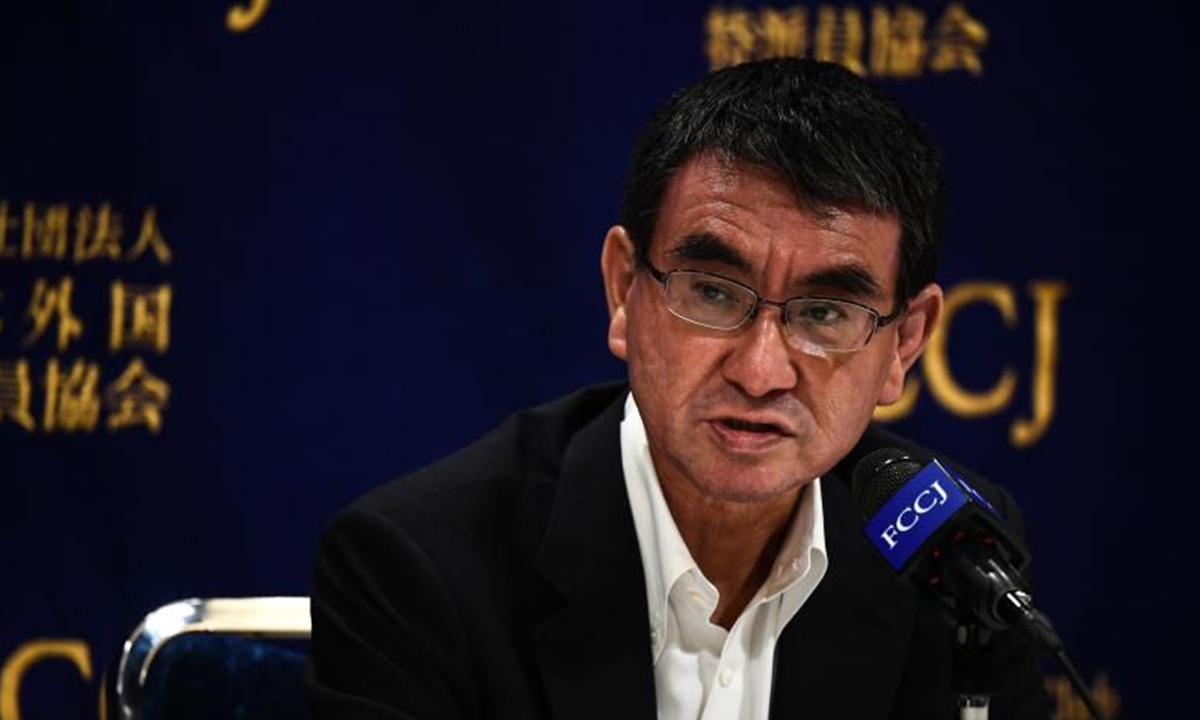New generation of Japanese politicians needs vigilant watching
By Da Zhigang Source: Global Times Published: 2020/10/12 19:53:40

Taro Kono Photo: Xinhua
Since Japanese Prime Minister Yoshihide Suga took office in September, his public approval rating has been high. Japanese people have been placing great expectations on his new cabinet's handling of the pandemic, economy and social security system.
The current cabinet is mostly made up of elderly policymakers. But there is a new generation of politicians in it too. Taro Kono, who previously served as minister of defense under former prime minister Shinzo Abe, has now become Administrative Reform Minister. Shinjiro Koizumi remains as Minister of the Environment. Nobuo Kishi, Abe's younger brother, became Minister of Defense. It is obvious that Suga tends to test and cultivate new generation of politicians in his cabinet.
In recent years, many new Japanese politicians have been hoping that the national identity of their country can be revitalized through reforms. They desire to make Japan a more relevant state in terms of dealing with regional and global affairs.
They have also unveiled their anxious mentality. They tend to be furious and believe the country has incompetent policies both at home and abroad. They are dissatisfied that Japan is on a conservative path with domestic issues while blindly following other major powers' steps in terms of international diplomacy. They are frustrated because they don't think their passion and know-how will be put to effective use.
The new generation of Japanese politicians advocates injecting fresh ideas and concepts to their country. For example, Kono is attempting to break Japanese cabinet's bureaucratic administrative work. He is asking government agencies to quit hanko stamps, which are used widely across Japan to officially sign a document in addition to using a signature. He also opposes printouts and faxing of documents, hoping that signatures can be replaced. These are classic examples of young politicians attempting to carry out reforms.
The politicians of new generation in Japan also support one another. Koizumi once clearly noted that he would back Kono if the latter joined the race for president of the ruling Liberal Democratic Party.
Against the backdrop of the pandemic, the new generation of Japanese politicians is focusing more on coordination with the US, Europe, and the Indo-Pacific Strategy. Issues relating to cooperation with China and South Korea come next in importance. "Containment" has become one of their core concerns.
They think Tokyo needs to deepen its alliance with Washington. They also believe it needs to ask US troops to aid national defense when necessary because of Japan's weak security environment.
At the same time, they seek to strengthen the US-Japan-India-Australia security mechanism, join the "Five Eye" alliance, and partner with other multilateral mechanisms as soon as possible. They feel this will provide additional global guarantees for Japan's security apparatus.
Wanting to realize their own political aspirations, these new generation political figures not only lead the edge, but they are also paying attention to the masses. The first is to show strength: by releasing tough or controversial speeches to activate nationalism, and even populism.
The second is to publicize their message as much as possible: establishing strong public opinion and images of their political figures and their messages.
The third is to cozy up to the young people. Utilizing various advantages, including facial attractiveness, they maximize penetration and influence. Koizumi and Kono are both masters in this regard.
The above trends and changes of the new generation of Japanese politicians deserve attention and even vigilance. Changes to both the old and new generations in Japan's political ecology will happen sooner or later. It is only a matter of time before these new generation political leaders come to the front stage.
Their current anxiety is a manifestation of Japan's consciousness of being prepared for danger in times of peace. It's an older sentiment rooted in Japan's psychology as an island nation. To some extent, their impatience is also based on islands' Bushido culture. The opportunities and associated risks of the new generation of Japanese politicians will determine whether or not Japan can rise again. It will also impact how Japan will face disasters.
Japan's new generation of politicians is becoming more and more influential. This not only is related to the future development of Japan's internal affairs, but also may influence new factors for how Japan relates with its neighboring countries. After World War II, generations of Japanese political figures have had differing relations with China with many twists and turns. The influence of the new generation of politicians cannot be underestimated in terms of where they will take Japan's future policies - particularly on China.
The author is director and research fellow of the Institute of Northeast Asian Studies at the Heilongjiang Provincial Academy of Social Sciences and chief expert at the Northeast Asian Strategic Studies Institute. opinion@globaltimes.com.cn
Posted in: VIEWPOINT,ASIAN REVIEW